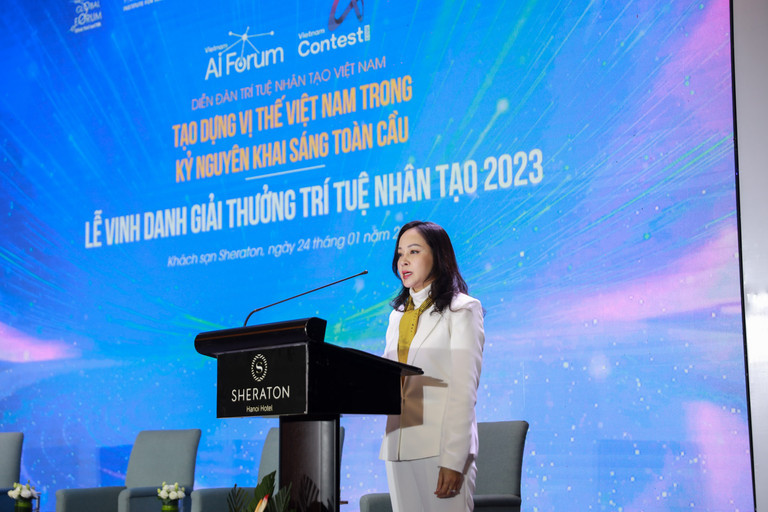
The event was co-organized by VietNamNet and VLAB Innovation.
In her opening speech, Hoang Thi Bao Huong, VietNamNet Deputy Editor-in-Chief, noted the Prime Minister’s instructions for digital transformation in 2024 at the year-end meeting of the National Committee for Digital Transformation. Vietnam needs to develop digital economy with four pillars: 1/ ICT industry 2/ digitization of business fields 3/ digital administration and 4/ digital data.
Minister of Information and Communications Nguyen Manh Hung at the conference reviewing the implementation of tasks in 2023 and discussing new tasks in 2024 stressed that 2024 must be the year of intensive application of AI (artificial intelligence) and virtual assistants.
Discussing how to create position and opportunities for Vietnam in the era of global enlightenment, Nguyen Anh Tuan, CEO of Boston Global Forum suggested a new approach - combining natural intelligence, computing science, and social systems to have a more unique approach that can solve more problems.
“The new era, AI era and the era of global enlightenment brings new opportunities for us to have new approaches and new models. The new approach is connecting human's thinking ability, rich imagination, and creative intelligence with the intellectual system and computing system,” Tuan said.
“It is the new thinking and new mindset that will help Vietnam have better, more comprehensive and adequate approach, and have a higher mindset,” he stressed.
“In my time, we only thought of applying and adapting the great achievements of the world in Vietnam. But today, I can see great opportunities for us to sit down and discuss new global models in the context of Vietnam’s deep international integration,” Tuan added. “It’s time to take actions."

Harvard University’s Prof Thomas E. Patterson said the new approach with AI technology harmonizing it with the natural world can create a launching pad for Vietnam to pioneer in the development of the field.
Dr David Silbersweig from Harvard Medical University had a presentation about the human brain and AI as well as how to form and develop a more natural AI.
He said both AI and the human brain are complex systems and it is necessary to understand them and their ways of interaction. The knowledge may help to develop technology in a safer and more useful way.
Silbersweig and his co-workers hope to promote a human-centered AI through the combination of natural and neural systems. They hope they can develop more humane forms of AI interactions in a rapidly evolving world.
Vietnam’s firm named among global top 20 AI researchers
Bui Hai Hung, CEO of VinAI, shared information about Vietnam’s AI development capability.
The New York Times, in its article published recently, mentioned Alpha Geometry developed by Google Deep Mind which has the ability to solve geometry problems like International Mathematical Olympiad gold medal winners. Seventy-five of the engineers inventing Alpha Geometry are Vietnamese, working in the US.
Meanwhile, on the list of the best AI research firms in the globe in 2022, one can find the name of VinAI, a Vietnamese company.
The future of Vietnam’s AI
The scientists and researchers attending the event discussed and proposed new issues.
Tuan of the Global Boston Forum said the forum and Vatican will organize dialogues with religious organizations to build new spiritual values.
Prof Tran Ngoc Vuong, who has spent many years studying social and humanitarian sciences, commented that there are three things belonging to human intelligence which AI cannot replace as a biological entity – will, complex emotions, and desire.
Dr Nguyen AI Viet, former head of the IT Institute under the Hanoi National University, believes that a new scientific discipline called data physics, which can design models based on AI, can help teaching of physics at school.
One first prize, two second prizes and three third prizes were awarded to students at the event. The first prize went to Nguyen Ngoc Duy from Vinh Phuc High School for the Gifted.
Pham Binh Minh